

Open Badges in Higher Education Conference. On 8th March 2016 The University of Southampton is hosting the Open Badges in Higher Education Conference aimed at raising awareness of the huge amount of activity both in Higher Education and in the commercial world for Open Badges.

Discussions and workshops will investigate the use of alternative credentials for recognising achievements of skills and co-curricular contributions within the student experience. The University of Southampton is currently inviting proposals for contributions to this exciting event. Submissions will be accepted until early January 2016. If you would like to express your interest or would like further information on contributing to this event please contact Katie Eason on ke@soton.ac.uk or submit your proposal on the form below. We also encourage you to register for your place at the conference now as places are limited. Student Ambition. Taking Another Look at the Digital Credentials Landscape. Recently, I’ve been having some interesting conversations about the digital credentials landscape.
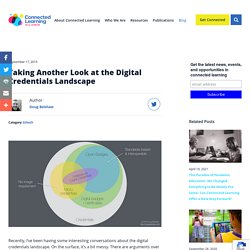
On the surface, it’s a bit messy. There are arguments over whether the term “Open Badges” should be used over the more generic “digital badges”; startups are talking about“‘micro-credentials”; and in my own work consulting with City & Guilds (an awarding body in the UK), we’ve been talking about “professional digital credentials.” In this post, I want to spend a little time teasing out the differences between the various terms and explaining why I think the diagram at the top of the post might help make sense of the current landscape.
Some background Back when I was a teenager, I can remember being unduly excited when I read about Bluetooth, a new standard for being able to pair and push information between devices. My point is that technological innovations take time to become embedded. Similarly, Open Badges is a similar “foundation layer” to credentialing. The Landscape. The Future of Open Badges is Verifiable. When Open Badges was kicking off ten years ago (see the original white paper), it was conceived to be a recognition infrastructure for skills attained and achievements accomplished anywhere at any time.
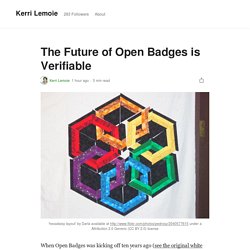
Badges could assert skills learned informally, formally, really in any aspect of and through life. It was hoped that recruiters, employers, and others could evaluate the badges to find people who had skills that aligned with the opportunities being offered. It was envisioned they could work like other types of credentials such as degrees and certifications, “but with room for much more granular or diverse skill representation” and available opportunities to capture these skills.
The infrastructure for this type of recognition system was a format called a digital badge. More than just a digital sticker, the badges would be filled with metadata properties describing the skills and achievements. Verifying Continuing Ed: Denise was offered a new job at a hospital as a physician assistant. Twitter's top #openBadges articles from the past 7 days - TheHerdLocker.com.
Open Badge Designer. Competency Badges: the tail wagging the dog? – Learning Futures. Introduction More than three decades ago, I started a journey exploring how technologies could contribute to making one’s competencies more visible, especially for those who didn’t have the chance to receive a formal qualification.
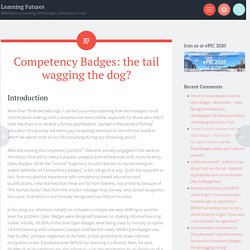
Started in the world of formal education this journey led me to pay increasing attention to the informal world in which we spend most of our life (including during our schooling years!). After discovering the competency portfolio I became actively engaged in the work on ePortfolios (that led to many European projects and conferences) and, more recently, Open Badges. While the “normal” trajectory should have led to my becoming an ardent defender of “competency badges”, it did not go that way. Competency Badges: the tail wagging the dog? - Serge Ravet - Medium. Introduction More than three decades ago, I started a journey exploring how technologies could contribute to making one’s competencies more visible, especially for those who didn’t have the chance to receive a formal qualification.
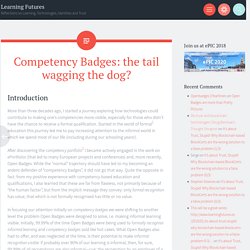
Started in the world of formal education this journey led me to pay increasing attention to the informal world in which we spend most of our life (including during our schooling years!). After discovering the competency portfolio I became actively engaged in the work on ePortfolios (that led to many European projects and conferences) and, more recently, Open Badges. While the “normal” trajectory should have led to my becoming an ardent defender of “competency badges”, it did not go that way. Drivers for Change in Higher Education - Maxwell - 2020 - New Directions for Community Colleges. Using digital badges as goal-setting facilitators: a multiple case study. New report offers analysis of microcredential completers.
A new report from two researchers at Teachers College of Columbia University offers some hints about who exactly is completing microcredential courses and what the benefits of doing so might be.

Microcredentials -- badges or certificates that one can achieve by completing a set of courses from companies like edX and Coursera -- have been gaining ground in recent years. Universities have typically partnered with the companies to build the certificates -- called MicroMasters at edX and Specializations at Coursera -- and will sometimes accept them in place of an admissions requirement like the GRE or as partial credit toward a master’s degree at the institution. Story continued below… Enjoying this article from Inside Digital Learning? Sign up for the free weekly newsletter.
I have read and agree to the terms ofInside Higher Ed’s Privacy Policy The new report did suggest that in some areas those who start the programs and those who complete them might be demographically different. Arbeitspapier: Kompetenzen sichtbar machen mit Open Badges. Students support digital-only credentials from Linnaeus University, Sweden. Eighteen months into the project, and Ulrika Ehrenstråhle, degree manager at the university in Växjö, told The PIE News that students have been the clear winners from the decision.
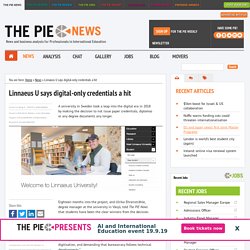
“The reaction from the student union, when involving them in the process, was ‘why hadn’t we done it sooner’,” related Ehrenstråhle. “We see this as one of many proofs that students are adaptive to digitisation, and demanding that bureaucracy follows technical developments.” Now, since this summer, certificates for police education completed at the university are also being issued electronically. Ehrenstråhle added that after issuing the first certificates only electronically, some questions came up from students about how to verify them as bona fide.
“We see this as one of many proofs that students are adaptive to digitisation” “We decided after some months to expand our information to the students when receiving the certificates, and the questions has since then been rather absent,” she noted. 10 platforms for issuing Open Badges – We Are Open Co-op. Ontario Open Badges Forum. My quest for recognition – MIRVA. Session 15. Why do we believe in Open Recognition and Open Badges? – MIRVA. A spot on answer to this question was given by no one else then Mehdi Gharsallah, Digital Strategy Advisor at the Ministry of Higher Education and Research in France.
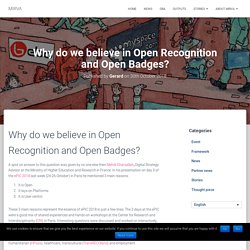
In his presentation on day 3 of the ePIC 2018 last week (24-26 October) in Paris he mentioned 3 main reasons: It is OpenIt lays on PlatformsIt is User centric These 3 main reasons represent the essence of ePIC 2018 in just a few lines. The 3 days at the ePIC were a good mix of shared experiences and hands-on workshops at the Center for Research and Interdisciplinarity (CRI) in Paris. Digital Credentials Institute. European Parliament passes a blockchain resolution. Nostalgia, gamification and staff development – moving staff training away from didactic delivery. An overview We identified TELFest – our annual Technology-Enhanced Learning Festival at the University of Sheffield as a good opportunity to experiment with a gamified session.
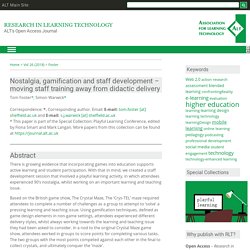
TELFest is a week-long staff development festival, where colleagues from across the institution come together to share best practice, learn about new pedagogical and technological approaches, and showcase their own work. Sessions are varied between short ‘how-to’ bitesize sessions, panel discussions where key institutional themes are explored, case studies of practice and more engaging workshop sessions that require staff participation (Latif 2017).
With this variety of available formats, we felt comfortable taking a risk to deliver this session: Craft (2005) writes that ‘Creativity needs time, flow, interaction, suspension of judgement, and risk-taking’. The theme we wanted to tackle was accessibility, specifically when setting learning goals and assessment. Developing the session Define business objectives. Badgeons la Normandie – Vers un territoire apprenant. Badge Designer - Create beautiful open badges. Open Badges Baking Specification. Bologna Open Recognition Declaration (bord) Toward an Open Architecture for the Recognition of Learning Achievements In 1999, the Bologna Declaration proposed a European Higher Education Area in which students and graduates could move freely between countries, using prior qualifications in one country as acceptable entry requirements for further study in another.
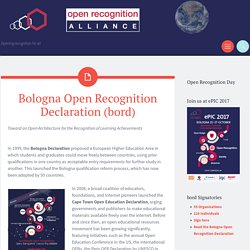
This launched the Bologna qualification reform process, which has now been adopted by 50 countries. In 2008, a broad coalition of educators, foundations, and Internet pioneers launched the Cape Town Open Education Declaration, urging governments and publishers to make educational materials available freely over the internet. Before and since then, an open educational resources movement has been growing significantly, featuring initiatives such as the annual Open Education Conference in the US, the international OERu, the Paris OER Declaration by UNESCO in 2012 and, of course, Creative Commons, with us since 2003.
Sign the Declaration and get your supporting badge. Ubiquitous Learning and Digital Badges in the Age of Hyper-connectivity. Credly Receives Open Badges Certification. Digital Badges Credly Receives Open Badges Certification Digital credentials provider Credly has become the first platform to receive official certification from the IMS Global Learning Consortium for compliance with the Open Badges Standard. Originally developed by the Mozilla Foundation, the Open Badges specification is designed to "ensure a plug-and-play ecosystem for digital credentials earned across different environments," according to a press release. Management of the standard was taken over by IMS Global this past January. Using Open Badges to support student engagement and evidence based practice.
Bryant, P., Coombs, A. and Pazio, M. (2014) ‘Are we having fun yet? Institutional resistance and the introduction of play and experimentation into learning innovation through social media.’ Conference paper. Backpack — I Choose You! – Matt Rogers – Medium. It seems like over the past few weeks we’ve been having lots of conversations about the role of the Backpack in the Open Badges community. Be it through the IMS working group calls or when speaking directly with clients and other platforms. Various members of the Digitalme team have blogged and shared their thoughts around the potential and future direction of the Backpack and so it felt right to add my thoughts into the mix. Some caveats before we get to it, this isn’t going to be anything technical, mainly because I’d be way out of my depth, but more an emotive and reflective piece on my (and our journey as Digitalme) experiences since leading out on the recent developments.
N.B. There are likely to be Pokémon references throughout this blog — for that I do not apologise. Why We Use Digital Badges at Del Lago Academy. By Alec Barron Del Lago Academy in Escondido, California, is a public high school of about 800 students focused on Applied Sciences. Educators here really want students not only to have desirable skills and knowledge for potential employers but to do meaningful work in school that feels relevant and connects to their lives now.
In order to ensure we’re meeting these objectives, we realized we needed a way to assess what students were doing throughout the scientific process and not just by observing the final projects they turn in. Thus our digital badging system, Competency X, was born. Open Badges for Higher Education. European Badge Alliance. Learning happens everywhere and on the move: Let’s recognise it!
Today’s learning opportunities for young people are limitless. Individuals acquire new competences not only in the traditional setting of a classroom or at work, but increasingly outside of these environments. Important learning takes place through participation in civil society, volunteering or traveling.
These experiences generate skills, knowledge and wider competences that o en remain invisible. Learning mobility is one of the key ways in which people can enhance their development as active citizens and strengthen their future employability by developing personal and professional competences, as well as communication, interpersonal, and intercultural skills. The existing recognition tools are not fully answering to the need for self reflection on and awareness, nor do they provide recognition and validation and of the key competences acquired by young people in these contexts.
Article Badges Aren’t Just for Brownies. Badge Systems - Open Badges In Higher Education. Who's Issuing Open Badges? A Review of Open Badge Platforms – iChamps. 2016 AAEEBL Midwest Meeting Keynote: Open Badges + ePortfolios: Searching for and Supporting Synergy. Digication Brings Verified Digital Badges and Credentials into Learner ePortfolios through Powerful Integration with Credly.
Badge List Blog — Announcing Badge Portfolios: Resumes for the... Bitcoin and Blockchains explained. 39Share1 27 A slightly off-camber post here, but someone I trust mentioned that we ought to understand the bitcoin and blockchain development as it could be about to hit the mainstream. Training and Skills Blog. What we learned from designing an academic certificates system on the blockchain — MIT MEDIA LAB.
Flow Chart - Open Badges In Higher Education. Les badges numériques et la révolution de l'apprentissage - OCE - L'Observatoire compétences-emplois. Version PDF de cet article Avec l’arrivée de l’ère numérique et d’internet, la possibilité d’apprendre et de développer des compétences est quasi sans limites. Geoffroi Garon. Entrepreneur @pygnum Valoriser le capital humain – Badges numériques #Openbadges. Understanding Digital Badges and Open Badges. ePortfolios & Open Badges Maturity Matrix.
For an Open Badge Framework (Green Paper) For an Open Badge Framework (Green Paper) Pairing E-Portfolios With Badges To Document Informal Learning. Open Badges - now with Endorsements - Think Out Loud Club. Badges. Open Badge Factory. Introducing the Open Badges 101 course! [pre-alpha] Cultural Localisation of Open Badges. Extending Badges. Are-Digital-Badges-a-New-Measurement-of-Mastery?mktcops=c.sol~c.lt~c.learning-and-development&mktcois=c.assessment-credentialing~c.tools-platforms~c. An exciting week for Open Badges. Open Badges: Exploring the value, potential and practicalities of a new way of recognising skills in Higher Education.
Survey Shows Growth Of Open Badges. Looking to 2015: Digital Badging for the 21st Century - Looking to 2015: Digital Badging for the 21st Century. Pearson Labs. Recognizing, Supporting, and Attracting Adult Learners with Digital Badges. Open Badges for Engagement, Participation and Progression in the Arts (#artsdigital) What is Open Badge Factory? Creating learning pathways with Open Badges. Taxonomy of Digital Badges / Open Badges - Google Sheets. 4 Benefits To Using Badges In Online Learning. MOOC Badging and the Learning Arc. OLDS-MOOC badging strategy. Digitalbadgesanannotatedresearchbibliography_hastac.pdf. All About That Badge.
15/10/2014 - Badges numériques ouverts en éducation - En ligne. OpenBadges.me. Fonts & graphics. 5 Great Resources for Creating Digital Badges - LearningMesh. .........Experimental Blog: #Openbadges Simplest Possible Message about Open Badges. Open Badges in Bb Open Education #GCUGamesOn. Home - Savvyfolio.net. Open Badges for Training & PD - Savvyfolio.net. Badges/Onboarding-Earner. Open Badges Blog — How To Display Your Open Badges on Your LinkedIn Profile. Open Badges. Evidencing Employability Skills with Open Badges. Conference 2014 Videos. Badges - La modification. Badges - La modification. Badges - La modification. Announcing Mozilla BadgeKit. Interesting Articles. Digital Badges: a New Currency for Professional Credentials. Blackboard Learn. Digital Badges: An Annotated Research Bibliography v1.